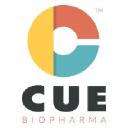Companies
Discover all trending biotech companies
Discover all trending biotech companies

Company Research Platform
Annual Revenue
$ 9,300,000
Global Employees
57
R&D Investment
8550000
This segment focuses on developing Immuno-STAT biologics to target and activate antigen-specific T cells for the treatment of various cancers. Key research and development activities include preclinical studies and clinical trials for CUE-101 (targeting HPV-driven cancers), CUE-102 (targeting recurrent glioblastoma), and CUE-103 (targeting KRAS G12V mutations in colorectal, lung, and pancreatic cancers). The technology leverages the Immuno-STAT platform to redirect the patient's own immune system to fight cancer cells. Patient impact is centered on improving response rates and overall survival in patients with difficult-to-treat cancers. The market positioning involves offering targeted immunotherapies with potentially fewer side effects than traditional treatments. Future opportunities include expanding the pipeline to address additional cancer targets and combination therapies. Clinical trials are ongoing to assess safety and efficacy, with regulatory pathways being pursued for potential approvals.
This segment is dedicated to the research and development of Immuno-STAT biologics for the treatment of autoimmune disorders. The primary focus is on developing therapies that can selectively modulate the immune system to restore balance and prevent the body from attacking its own tissues. Research activities involve identifying specific immune targets and designing Immuno-STAT molecules that can interact with these targets to dampen the autoimmune response. Technologies used include protein engineering, antibody development, and cell-based assays. The therapeutic areas covered include rheumatoid arthritis, lupus, multiple sclerosis, and inflammatory bowel disease. Patient impact is focused on reducing inflammation, alleviating symptoms, and improving the quality of life for individuals with autoimmune conditions. Market positioning involves offering targeted therapies with potentially fewer systemic side effects than traditional immunosuppressants. Future opportunities include expanding the pipeline to address additional autoimmune targets and personalized medicine approaches. Collaborations with companies like Boehringer Ingelheim are crucial for advancing these programs.
This segment is focused on developing Immuno-STAT biologics to address chronic infectious diseases. The research and development efforts are centered on creating therapies that can enhance the immune system's ability to clear persistent infections. Key activities include identifying specific viral or bacterial targets and designing Immuno-STAT molecules that can activate T cells to eliminate infected cells. Technologies used include protein engineering, cell-based assays, and in vivo models of infection. The therapeutic areas covered include chronic viral infections such as HIV, hepatitis B, and HPV. Patient impact is focused on achieving viral clearance, preventing disease progression, and improving long-term health outcomes. Market positioning involves offering targeted immunotherapies that can complement existing antiviral treatments. Future opportunities include expanding the pipeline to address additional infectious disease targets and developing prophylactic vaccines. Clinical trials are essential for assessing the safety and efficacy of these therapies.